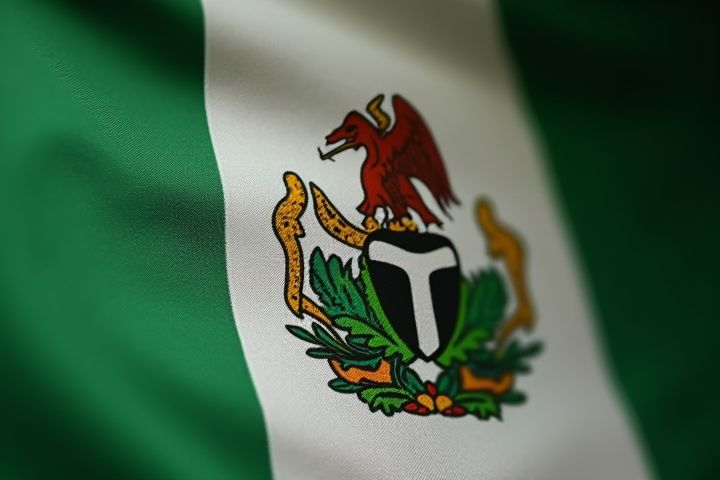
Nigeria does not have an official national language recognized by law; however, English serves as the official language and is widely used in government, education, and business. The country is home to over 500 indigenous languages, reflecting its rich cultural diversity, with Hausa, Yoruba, and Igbo being the three most prominent. Each of these languages has millions of speakers and plays a crucial role in the identity and heritage of their respective ethnic groups. Pidgin English is also popular, serving as a lingua franca across various regions. Understanding these linguistic dynamics is essential for effective communication and cultural appreciation in Nigeria.
The official language is English
Nigeria's official language is English, a legacy of British colonial rule, which facilitates communication in a country with over 500 indigenous languages. This linguistic diversity allows for rich cultural expressions across regions, from Yoruba in the southwest to Hausa in the north and Igbo in the southeast. English serves as a unifying medium in government, education, and business, promoting national cohesion among Nigeria's diverse ethnic groups. You will find that proficiency in English is crucial for accessing higher education and global opportunities, making it an important skill in today's interconnected world.
English is used in government
Nigeria's official national language is English, which serves as a crucial medium for government operations and legal proceedings. As a former British colony, Nigeria adopted English to unify its diverse population, which comprises over 500 ethnic groups and languages. In government settings, English facilitates communication among officials and citizens, ensuring that policies, laws, and public services are accessible to all. Your understanding of English can enhance participation in Nigeria's democratic processes and access to vital information.
English is the medium of instruction in schools
Nigeria's official language is English, which serves as the primary medium of instruction in schools across the country. English facilitates communication in a nation with over 500 indigenous languages, helping to bridge cultural and linguistic divides among diverse ethnic groups. In educational settings, the use of English is crucial for accessing academic resources, conducting research, and fostering international collaboration. For students, mastering English is essential for future opportunities, both domestically and globally.
English is prevalent in business
Nigeria's national language is not officially designated, but English serves as the de facto language of communication, especially in business. With over 250 ethnic groups, the diverse linguistic environment necessitates a common language for commerce, governance, and education. English is utilized in formal settings, facilitating trade and investment opportunities within Nigeria and with international partners. Your ability to converse in English can significantly enhance professional interactions, making it essential for success in Nigeria's dynamic and growing economy.
English is common in media
Nigeria's national language is English, reflecting its historical ties with British colonialism and its role as a lingua franca among the country's diverse ethnic groups. English is commonly used in various media platforms, including television, radio, and print, facilitating communication across Nigeria's 250 ethnic languages. This prevalence in media contributes to the dissemination of information and cultural exchange, making English essential for social cohesion and national identity. You will find that most formal education and government operations are conducted in English, further cementing its status as a crucial element of Nigeria's socio-political landscape.
Nigeria has over 500 ethnic languages
Nigeria's national language is English, a remnant of its colonial history, which serves as a unifying medium of communication among its diverse population. With over 500 ethnic languages spoken across the country, such as Hausa, Yoruba, and Igbo, the linguistic landscape is incredibly rich and complex. These indigenous languages reflect Nigeria's cultural heritage and social identity, emphasizing the importance of language in preserving traditions and fostering community ties. Understanding this linguistic diversity is crucial if you wish to engage meaningfully with Nigeria's vibrant mosaic of cultures.
Hausa, Yoruba, and Igbo are major regional languages
Nigeria does not have an official national language; however, English serves as the official language due to its historical ties. Hausa, Yoruba, and Igbo are the three major regional languages, each representing distinct ethnic groups and cultures. Hausa, predominantly spoken in the north, is known for its rich history in trade and diplomacy. Yoruba, concentrated in the southwest, boasts a vibrant cultural heritage enriched by its complex art and music, while Igbo, primarily found in the southeast, is famed for its entrepreneurial spirit and diverse traditions.
Pidgin English is widely spoken
Nigeria's national language is English, serving as the official language for government and education. However, Nigerian Pidgin English, often simply referred to as Pidgin, is widely spoken across the country, transcending ethnic and regional divides. This creole language incorporates elements from English, indigenous languages, and Portuguese, making it a vibrant medium for communication in urban areas. You may find that Pidgin expresses cultural nuances and local humor, reflecting Nigeria's rich linguistic diversity.
Multilingualism is common
Nigeria does not have an official national language; however, English serves as the official language, reflecting the country's colonial history. With over 500 indigenous languages spoken, Nigeria is one of the most linguistically diverse countries in the world, showcasing a rich tapestry of cultures and traditions. Hausa, Yoruba, and Igbo are among the most widely spoken languages, commonly used in daily communication within their respective regions. Embracing multilingualism, you can interact with various ethnic groups and deepen your understanding of Nigeria's vibrant heritage.
Language influences cultural identity
Nigeria's national language is English, a remnant of colonial influence that plays a crucial role in uniting the country's diverse ethnic groups and cultures. With over 520 indigenous languages, including Hausa, Yoruba, and Igbo, English serves as a lingua franca, enabling communication across various regions and fostering a shared national identity. Language profoundly influences cultural identity, as it carries historical narratives, traditions, and collective memories unique to each ethnic group. Embracing multilingualism enriches Nigeria's cultural tapestry, allowing individuals to express their heritage while also participating in a broader national discourse.
